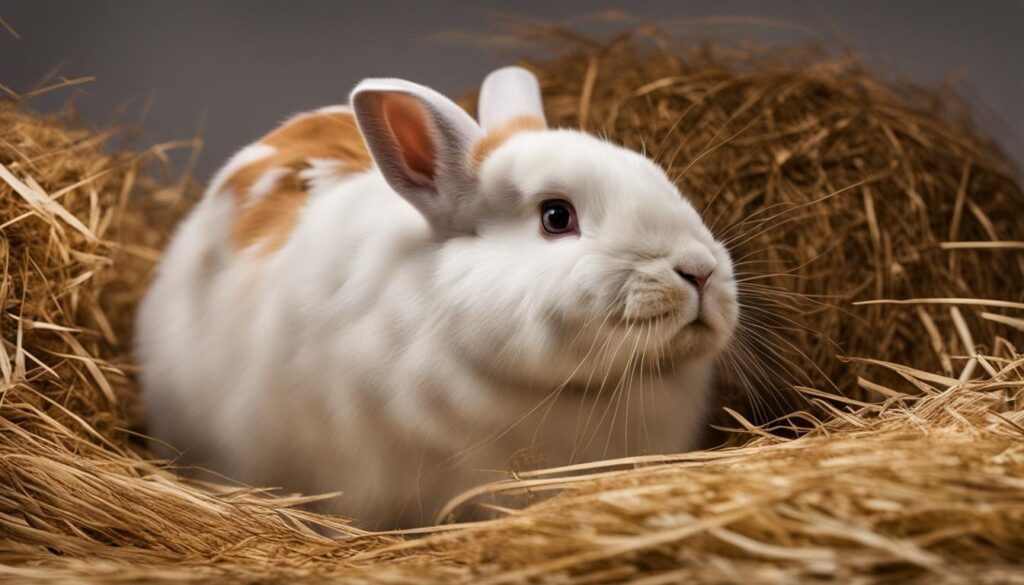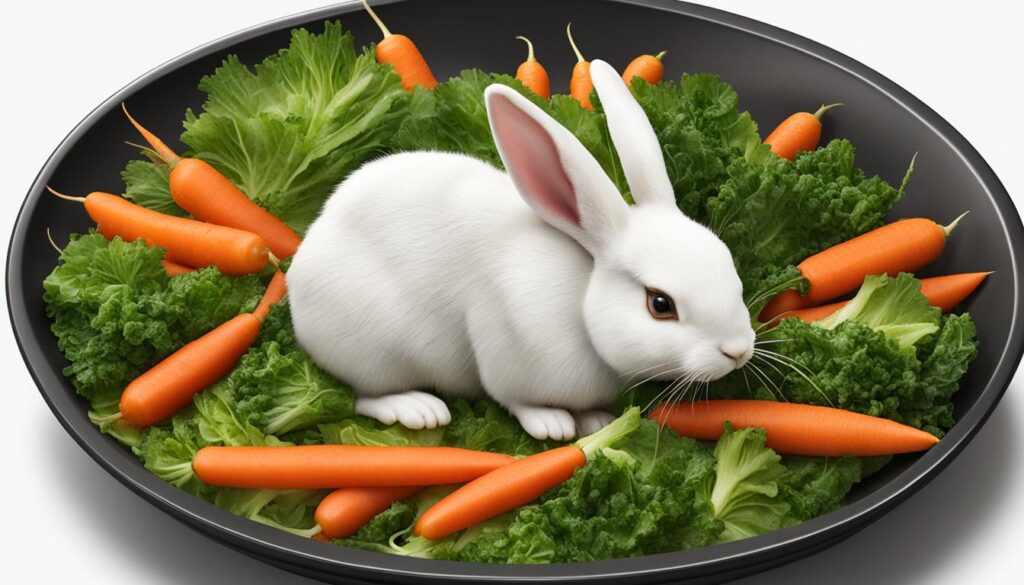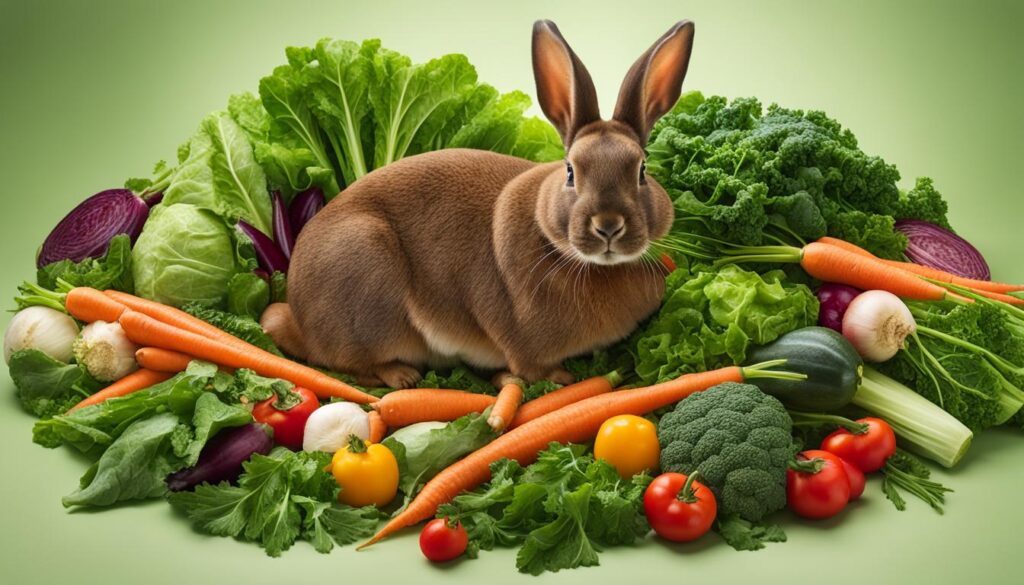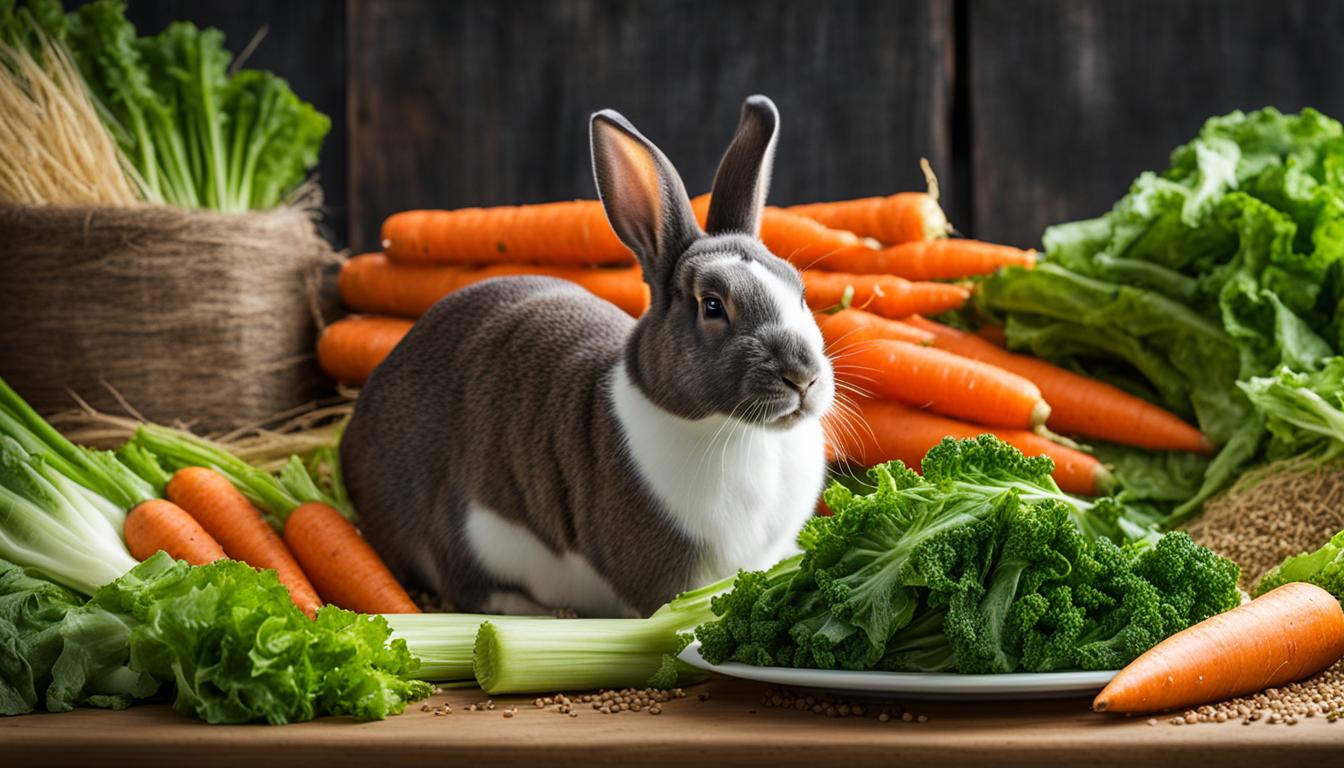Nutritional Needs of Rabbits: What to Feed Your Furry Friend
Welcome to our guide on the nutritional needs of rabbits. As a responsible pet owner, it’s crucial to understand the importance of a proper diet for your furry friend. Providing the right food is essential for their overall health and well-being. In this article, we will discuss the ideal rabbit diet, including the main food groups and their nutritional benefits. By following these guidelines, you can ensure that your rabbit receives the necessary nutrients for a long and happy life.
Key Takeaways:
- Rabbits have specific feeding requirements for a healthy life.
- Hay should be the main component of their diet, providing fiber and promoting dental health.
- Pellets are important for balanced nutrition, but should be given in restricted amounts.
- Leafy greens should be included daily for essential vitamins and minerals.
- Fruits can be offered as occasional treats, but should be fed sparingly due to their high sugar content.
The Importance of Hay in a Rabbit’s Diet
When it comes to the health of your furry friend, a proper diet plays a crucial role. One of the key components of a rabbit’s diet is hay, which provides essential fibre and offers numerous benefits for their dental health.

Hay serves as a primary source of fibre in a rabbit’s diet, promoting a healthy digestive system and preventing gastrointestinal issues. It helps keep their guts working efficiently by aiding in the movement of food through their digestive tract.
Additionally, rabbits’ teeth have a natural inclination to grow continuously throughout their lives. The act of chewing on hay wears down their teeth, preventing overgrowth and related dental problems. It also provides them with mental stimulation, preventing boredom.
It is crucial to ensure that your rabbit has continuous access to large quantities of hay or dried/fresh grass. This allows them to graze and nibble throughout the day, mimicking their natural foraging behavior.
Timothy hay is recommended for adult and senior rabbits due to its lower calcium content, which is important for their urinary health. On the other hand, baby rabbits and young rabbits should have alfalfa hay because of its higher calcium levels, supporting their growth and development.
Make hay a staple in your rabbit’s diet to support their overall well-being and to keep their teeth and digestive system healthy.
Balanced Nutrition with Pellets
Pellets are an essential part of a rabbit’s diet, providing them with the necessary nutrients that may not be obtained from hay alone. It is crucial to choose high-quality pellets that are free from added sugars or artificial additives. By incorporating pellets into your rabbit’s diet, you can ensure they receive a balanced and nutritionally complete meal.
Rabbit pellets are specially formulated to provide the right balance of proteins, fibers, vitamins, and minerals that rabbits need to thrive. These pellets are carefully crafted to meet the specific nutritional requirements of rabbits, making them a convenient and reliable food source.
When selecting pellets for your furry friend, opt for options made from quality ingredients and without any fillers. Look for timothy hay-based pellets for adult and senior rabbits, as they are lower in calories and calcium. For baby rabbits and young rabbits, alfalfa hay-based pellets are recommended as they provide the necessary nutrients for growth and development.
However, it is crucial to feed pellets in restricted amounts to avoid potential health issues such as obesity and dental problems. Follow the recommended serving size provided on the pellet packaging and consult your veterinarian for specific feeding guidelines based on your rabbit’s age, weight, and activity level.
Remember, pellets should not be the sole component of your rabbit’s diet. They should be accompanied by an abundance of hay, leafy greens, and occasional fruits to ensure a well-rounded and balanced menu.
| Benefits of Balanced Nutrition with Pellets: |
|---|
| 1. Adequate Nutrition: Pellets provide essential nutrients for overall health and well-being. |
| 2. Convenient and Easy: Rabbit pellets are a convenient way to ensure your pet receives a complete and balanced diet. |
| 3. Dental Health: Chewing on pellets helps wear down rabbits’ continuously growing teeth, promoting proper dental hygiene. |
| 4. Customized for Different Life Stages: There are specially formulated pellets for adult rabbits, senior rabbits, and young rabbits to meet their unique nutritional needs. |
Expert Tip:
“When introducing pellets into your rabbit’s diet, do so gradually. Begin by mixing a small amount of pellets with their existing diet and gradually increase the proportion of pellets over time. This gradual transition helps prevent any digestive upset or refusal of the new food.” – Dr. Emily Rodriguez, DVM

By providing your rabbit with a balanced diet that includes the right amount of rabbit pellets, you can ensure their nutritional needs are met. Remember to consult with your veterinarian for personalized feeding recommendations to keep your furry friend healthy and happy.
Incorporating Vegetables into Your Rabbit’s Diet
Adding vegetables to your rabbit’s diet is essential for ensuring their overall health and well-being. Vegetables provide a wide range of vitamins and minerals that are vital for your furry friend’s nutritional needs. In particular, leafy greens are an excellent choice as they offer a high nutritional value and are generally enjoyed by rabbits.
Leafy greens such as kale, lettuce, and cilantro should be a daily part of your rabbit’s diet, making up approximately 15% of their overall food intake. These vegetables are not only rich in essential nutrients, but they also provide hydration, which is crucial for your rabbit’s well-being.
When introducing new vegetables to your rabbit, it is important to do so gradually. Start by offering small amounts and monitor your rabbit’s response. Some rabbits may have sensitivities or allergies to certain vegetables, so it is essential to watch for any adverse reactions such as digestive issues or changes in behavior.
To ensure your rabbit receives a variety of nutrients, it is a good idea to rotate the vegetables you offer. This will not only prevent dietary boredom but also provide different vitamins and minerals. Offering a mix of leafy greens, such as kale, Romaine lettuce, and Swiss chard, can help meet your rabbit’s nutritional needs.
However, it is important to note that not all vegetables are safe for rabbits. Some vegetables, such as onions, garlic, and potatoes, can be harmful and should be avoided. Always consult a veterinarian or rabbit care specialist if you are unsure about which vegetables are suitable for your rabbit.
“Incorporating leafy greens into your rabbit’s diet is a simple yet effective way to provide them with essential vitamins and minerals. Just like humans, rabbits benefit from a varied diet that includes a range of vegetables.”
Recommended Leafy Greens for Your Rabbit:
| Vegetable | Nutritional Value |
|---|---|
| Kale | High in Vitamin C, Vitamin K, and Calcium |
| Romaine Lettuce | Rich in Fiber, Vitamin A, and Vitamin C |
| Swiss Chard | Contains Iron, Magnesium, and Vitamin K |
Remember, a balanced diet for your rabbit consists of a combination of hay, pellets, and vegetables. By incorporating leafy greens into their daily meals, you can provide your rabbit with the essential nutrients they need to thrive.

Image: A rabbit enjoying a plate of fresh leafy greens. Vegetables are an important part of a rabbit’s diet and provide essential nutrition.
Fruit Treats in Moderation
Fruits can be a delicious and nutritious occasional treat for your rabbit. However, it’s important to remember that fruits have a high sugar content, which can contribute to obesity and other health problems if overfed. To ensure your furry friend stays healthy, it’s essential to feed fruits sparingly and incorporate them into a balanced diet.
Safe fruits for rabbits include:
- Apples
- Watermelon
- Berries
These fruits can be offered in small amounts to provide a tasty reward for your rabbit. Remember to remove any seeds or pits before feeding and wash the fruits thoroughly to remove any pesticides or dirt.
By limiting the frequency and portion size of fruit treats, you can avoid potential health issues associated with excessive sugar intake. Your rabbit’s primary diet should consist of hay, leafy greens, and high-quality pellets, with fruits reserved as occasional indulgences.
Always monitor your rabbit’s weight and overall health, adjusting the treat amounts as needed. It’s also important to consult with a veterinarian to ensure you’re providing the best nutrition for your rabbit’s specific needs.
A Balanced Diet for Your Bunny
While fruits can be a tasty occasional treat, they should not replace the essential components of your rabbit’s diet. Here’s a reminder of the key elements:
- Hay: Ensure your rabbit has a constant supply of hay as the primary source of fiber. It aids in digestion, prevents boredom, and promotes dental health.
- Leafy Greens: Include a variety of leafy greens such as kale, lettuce, and cilantro in your rabbit’s daily diet. They offer crucial vitamins and minerals.
- Pellets: Opt for high-quality pellets that are specifically formulated for rabbits. These pellets provide essential nutrients and should be given in limited amounts.
- Occasional Fruits: Offer safe fruits, such as apples, watermelon, or berries, sparingly as a special treat.
“A balanced diet is key to keeping your rabbit healthy and happy. Remember to prioritize hay and leafy greens, and use fruits as occasional treats.”
Conclusion
Providing a balanced and nutritious diet is crucial for the health and well-being of your pet rabbit. It starts with the foundation of their diet: hay. Make sure it makes up the majority of their meals, as it provides the necessary fiber for a healthy digestive system and wears down their teeth. Supplement their diet with leafy greens, such as kale and lettuce, for essential vitamins and minerals.
Additionally, include pellets in their daily routine to ensure they receive all the necessary nutrients. Opt for high-quality pellets without added sugars or artificial additives. Remember to give pellets in restricted amounts to avoid health issues such as obesity and dental problems.
Although fruits are a tasty treat for rabbits, they should be given sparingly due to their high sugar content. Stick to safe options like apples, watermelon, and berries as occasional indulgences. Keep in mind that maintaining a balanced diet is crucial, so don’t rely too heavily on treats.
Remember to monitor your rabbit’s food and drink intake regularly and consult with a veterinarian if you have any concerns or notice any changes. By following these guidelines and providing your furry friend with a well-rounded diet, you’ll ensure they receive the nutrition they need for a long and healthy life.
FAQ
What should rabbits eat?
Rabbits should mainly eat hay, leafy green vegetation, herbs, safe weeds, and a small amount of high-quality specialist nuggets/pellets. Muesli is not recommended, and commercial diets should be given in restricted amounts. Small amounts of fruits can be given as occasional treats. Fresh, clean water is also vital, and rabbits require the correct levels of calcium in their diet.
Why is hay important in a rabbit’s diet?
Hay is essential for a rabbit’s diet as it provides the required levels of fibre, helps keep their guts working efficiently, and wears down their continuously growing teeth. Rabbits should have continuous access to large quantities of hay or dried/fresh grass. Timothy hay is recommended for adult and senior rabbits, while baby and young rabbits should have alfalfa hay.
Are pellets necessary for rabbits?
Yes, pellets are another important component of a rabbit’s diet as they provide essential nutrients that may not be obtained from hay alone. High-quality pellets without added sugars or artificial additives should be given in restricted amounts to prevent health problems. Timothy hay-based pellets are recommended for adult and senior rabbits, while baby rabbits and young rabbits should have alfalfa hay-based pellets.
Can rabbits eat vegetables?
Yes, rabbits can eat vegetables. Leafy greens such as kale, lettuce, and cilantro should be given daily and make up 15% of their diet. Introduce new vegetables slowly and avoid unsafe ones such as onions, garlic, and potatoes. Rotate vegetables to provide different nutrients and prevent boredom.
Can rabbits have fruits?
Rabbits can have small amounts of safe fruits as occasional treats. However, fruits should be fed sparingly due to their high sugar content. Apples, watermelon, and berries are examples of safe fruits for rabbits. Avoid overfeeding fruits to prevent obesity and other health problems.
How can I provide a balanced diet for my rabbit?
To provide a balanced diet for your rabbit, make sure hay is the majority of their diet, with leafy greens, pellets, and occasional fruits added in moderation. Avoid unsafe foods and overfeeding treats. Regularly monitor your rabbit’s food and drink intake, and consult a veterinarian for any dietary changes.


